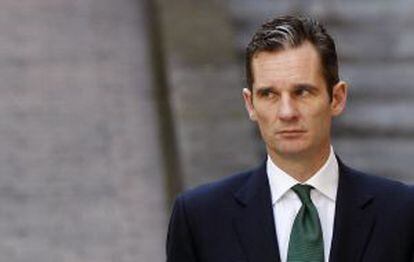Urdangarin carried out business as usual despite king’s orders
Royal son-in-law welcomes opportunity to "defend his honor" Businessman tells judge of Nóos request for 13 false bills

Iñaki Urdangarin, King Juan Carlos’ embattled son-in-law, acknowledged on Sunday that he had continued conducting his private businesses two years after being ordered by the Spanish monarch to resign from the Nóos Institute.
Urdangarin conceded that he had disobeyed the king’s orders during the second day of his testimony before a judge in Palma de Mallorca who has charged him in connection with a scheme to divert public money from his non-profit Nóos Institute.
Urdangarin denied any knowledge of a plan to siphon off funds, saying that he wasn’t aware of how billing was being done at the Nóos Institute because that wasn’t his area of expertise while he served as head of the non-profit entity from 2002 to 2006.
Urdangarin’s long-awaited closed-door testimony began on Saturday when he was met by scores of hecklers, including anti-monarchist and pro-Catalan independence groups, who gathered near the court house shouting insults at the royal son-in-law. “Chorizo, chorizo [thief],” people shouted at the visibly nervous, the Duke of Palma, Urdangarin’s official royal title. He old waiting journalists that he had hoped that his testimony would put an end to the ongoing press speculation that he stole public money from both the Balearics and Valencia regional governments.
“I have come to tell the truth and defend my honor,” he said on Saturday.
But by Sunday, a more relaxed Urdangarin was being put under intense interrogation by the public corruption prosecutor Pedro Horrach and Judge José Castro, who is investigating the case, and said that he couldn’t remember a lot of the dates and figures that were being thrown at him, according to lawyers who sat in in the courtroom that was closed off to the press and public.
Urdangarin said that after he stepped down from Nóos in March 2006 – at the request of the king as he had acknowledged the previous day – he made no effort to collect the 400,000 euros the Balearic Islands government still owed the institute. He did admit that he made the phone calls on behalf of his former partner Diego Torres, who asked him for the favor. Prior testimony by the then-sport director of the Balearics, José Luis “Pepote” Ballester, who has also been indicted, said the harassment was so great that he broke off his friendship with Urdangarin.
Urdangarin has tried to blame Diego Torres, according to lawyers, for all the irregularities that took place in Nóos, which received nearly three million euros from the Balearics to organize a series of sport and tourism conferences.
Judge Castro at one point, threatened to put Urdangarin “under torture” by calling Torres back to court for a confrontational testimony with the royal son-in-law – according to the lawyer for former Balearics regional premier Jaume Matas. But Horrach has said that he doesn’t plan on calling in Torres, at this point, for such a face-off session.
Nóos also received 3.7 million euros from the Valencia government in 2004. One curious gem that came out of the this weekend’s testimony focused on a meeting Urdangarin held with then-Valencia premier Francisco Camps and Valencia Mayor Rita Barberá to go over plans for organizing a series of sporting events to be called the Valencia Summit that were to be held between 2004 and 2006. Three days after that meeting, Camps signed a public decree authorizing the allotment of the public money to go to the institute, Urdangarin said.
Nóos was to collect a retainer fee of 900,000 euros a year, plus 350,000 euros for each event held. Tax inspectors have questioned why such exorbitant amounts were needed and the justification of such expense of public funds.
Judge Castro announced that he discovered that Nóos had asked a Barcelona firm to issue some 13 bills for services it did not perform, and which were eventually rejected by the Valencia government because they didn’t a contain a CIF company tax number.
Antonio Alberca, Matas’ lawyer, who has been sitting in on the testimony, told reporters on Sunday that Judge Castro is considering charging both Camps and Barberá in the case as the magistrate did with his own client.
Valencia’s United Left coalition (EU) has said that it will file a complaint against Camps and Barberá.










































